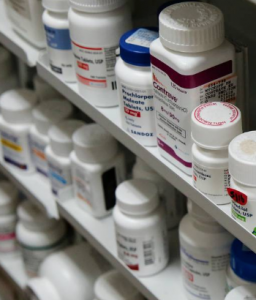A glance at the week’s happenings:
$3 million prize for playing Fortnite
So you thought all those hours spent playing video games were a waste of time for your teenager. Think again.

The winner! (Photo courtesy of Epic Games)
Sixteen-year-of Kyle Giersdorf won $3 million this week as the first Fornite World cup solo champion.
The payout for the Pottsgrove, Pennsylvania, teen was more than Tiger Woods made for winning the 2019 Masters Tournament. And we aren’t going to say how many public classroom teachers it would pay in a year.
The competition took place last Sunday at Arthur Ashe Stadium in New York.
Giersdorf, who goes by “Bugha” in the gamer world, says “words can’t explain it.”
Some 40 million players competed for a chance to play in the finals.
The tournament offered $30 million in cash prizes.
In second place, 24-year-old Harrison Chang, of the United States, won $1.8 million.
The duo competition was won by 17-year-old David Wang, of Austria, and 16-year-old Emil Pedersen, of Norway. They’ll split the $3 million prize.
Capitol One security breach affects 100 million applicants
A hacker gained access to personal information from more than 100 million Capital One credit applications, the bank said this week. A suspect, Paige Thompson of Seattle, has been arrested.

The hacker got information including credit scores and balances plus the Social Security numbers of about 140,000 customers, the bank said. It will offer free credit monitoring services to those affected.
Capital One said it believes it is unlikely that the information was used for fraud, but it will continue to investigate. The data breach affected about 100 million people in the U.S. and 6 million in Canada.
The bank said the bulk of the hacked data consisted of information supplied by consumers and small businesses who applied for credit cards between 2005 and early 2019. In addition to data such as phone numbers, email addresses, dates of birth and self-reported income, the hacker was also able to access credit scores, credit limits, and balances, as well as fragments of transaction information from a total of 23 days in 2016, 2017 and 2018.
Capital One Financial Corp., the nation’s seventh-largest commercial bank with $373.6 billion in assets as of June 30, is the latest U.S. company to suffer a major data breach in recent years.
Last Edition: Dying gasp of one local newspaper
The New York Times has published a heart-wrenching story about a death — of Warroad, Minnesota’s small weekly newspaper.

NYT photograph by Tim Gruber
By Reporter Richard Faussett, the story takes the reader through each, sad moment of the last day of the 121-year-old newspaper’s life — until its last gasp as the press rolls off the last of the final edition. 1,100 copies a week no more.
The Warroad Pion joined roughly 2000 newspapers that have closed in the U.S. over the last 15 years.
That is according to a study by the University of North Carolina soberly called “The Expanding News Desert.”
Read the whole New York Times story here.
White House backs Canada prescription plan
From the Miami Herald:
In a move that could help Gov. Ron DeSantis carry out an ambitious effort to cut drug prices, President Donald Trump’s administration on Wednesday announced a plan intended to make it easier for states like Florida to bring in prescription drugs from Canada and other countries.

Although the proposal has some restrictions, it could still be a victory for the Republican governor, a strong ally of the president.
DeSantis this spring convinced state lawmakers to carry out the drug-importation plan, despite fierce opposition from the pharmaceutical industry. Some Democrats had contended the legislation would amount to little, since it hinged on federal approval. . .
. . .Under the plan announced Wednesday, the Trump administration will move ahead with proposed rules that would allow drug importation from Canada on a demonstration basis and conditionally certify that the importations would not put the public at risk. The administration also is moving ahead with a rule that would allow manufacturers to import versions of FDA-approved drug products sold in foreign countries, if the manufacturers can prove the drugs are the same as the U.S. versions.
Wednesday’s announcement was met with sharp criticism from the pharmaceutical industry, whose leaders were quick to note that U.S. Health and Human Services Secretary Alex Azar previously had called drug importation programs “gimmicks.”
“The Administration’s importation scheme is far too dangerous for American patients. There is no way to guarantee the safety of drugs that come into the country from outside the United States’ gold-standard supply chain,” said Stephen Ubl, president and CEO of Pharmaceutical Research and Manufacturers of America, or PhRMA, which “represents the country’s leading biopharmaceutical research companies,” according to its website.
Meanwhile, a public health group called Partnership for Safe Medicines also blasted the plan, calling it a “reckless and politically motivated” proposal.
To see the whole story, click here.



















